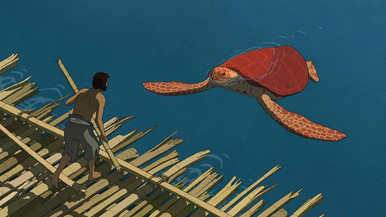Movie Review: The Red Turtle
By Steven Slater
March 29, 2017
BoxOfficeProphets.com

The Red Turtle is a very strange, absorbing tale, told with the whimsy of traditional animation. I feel that because the film is opaque in its meaning, this review must include my interpretation of the plot. So, I’m giving you a spoiler alert if you are interested in seeing the film. For context, I had not read too much about the film, other than knowing Studio Ghibli had a hand in it. I knew there was no dialogue, and that it was about a man’s relationship to a mysterious red turtle. However, cosmic coincidences decided to hand me a little more; I saw Cast Away for maybe the third time ever two days ago, and I heard an interview today with Bruce Feiler speaking about the original, misunderstood story of Adam and Eve. Both have surprisingly direct inferences towards this film.
A Man is adrift at sea, apparently after a shipwreck. He clings to a life boat, but that is dashed to pieces as he washes onto a deserted tropical island. He explores, has a first encounter with life and death, and finds a way to survive on the island, but inevitably all he desires is to leave. He builds boats from the plentiful bamboo stalks, but a mysterious force breaks them apart in the ocean. He builds bigger and bigger boats until finally he sees that a large red turtle appears to be wrecking them. Not content to allow this impasse to settle, he kills the turtle when it appears again on his island. Later, his guilt over this act compels him to care for the dead turtle’s carcass, which splits in two. A Woman emerges from within. He is astonished, keeps an eye on this strange woman, and eventually they connect in a spiritual way. They have a child, who grows into a young man himself. One day a tsunami destroys most of the island and nearly kills all of them, but the son saves the father’s life. One day the son leaves with a band of sea turtles, seeking something beyond the horizon. The man and woman live their lives on the island, until finally they die.
My main gripe with the film is not what it attempts to do with the medium. By the end, I understood that the film was an allegory for the director’s view of human life. The island is where we are all destined to be alone, where we can never escape who we are even if we did not choose who we would be born as. The man grows like we do, sensing each new epiphany as a change in our view of the world. His first encounter with life or death is a powerful lesson; he cannot always know he will live, but can only do his best to try. My issue is that the film is a bit too abstract in how it connects the dots. While I can see how each moment or event is related to a larger story of being human, they seem a little too random. Things do not feel like they follow any sort of logic. While this may concur with some people’s view of human life, it does not connect to any deeper emotional core from my viewing perspective. That is not to say that individual moments do not inspire reflection and introspection.
When the Man sees a baby turtle sprout from the sand, he sees an innocent creature, and helps it into the ocean. When he sees a grown turtle breaking his boat apart, he sees a creature with purpose, and exacts vengeance as his rage consumes him. He learns a lesson in what man is capable of, and then of guilt when he is calm and reflective. All too late, he sees what he has done, and tries to revive the now dead turtle. Later, his wife, born from the turtle, imparts some of that physical being to their son, who seems able to swim and communicate with other turtles. Is the red turtle the tree of knowledge, red like the apple Eve plucks? This films has beautiful moments, and tries teaching important lessons in a unique way, but it is more like a series of vignettes than a whole story. This could be one of those films that is very divisive; you either love it or hate it. I find I can appreciate it, but never felt pulled into the film as deeply as I thought I should be. Perhaps seeing Cast Away had me unfairly comparing the two, although I prefer the simple narrative of The Red Turtle to the book-ended narrative of the Tom Hanks film.
At the end of the film I felt I had “got” it. I could look back and ponder the various moments and try and connect them to what we all experience as human beings. In that regard, I would say the film is successful in stimulating thought of some sort. The animation is wonderful as you would expect (a simpler style, like Ghibli’s Tale of Princess Kaguya). There are a couple of cute crabs that fill a few moments with inspired puppy-like antics; they remind me of the soot sprites in Totoro. But overall, the film gave me the impression of a work of modern art. A bunch of things thrown onto a canvas, with color and shape, but too abstract to evoke emotion. You can talk about how the various parts mean something, but boil it down to its essence and it does not move the soul. I am certain, however, that this film could be deeply moving for those who do connect with it. I wish I could have seen the version Hayao Miyazaki would have drawn.
Slater Grade: C+